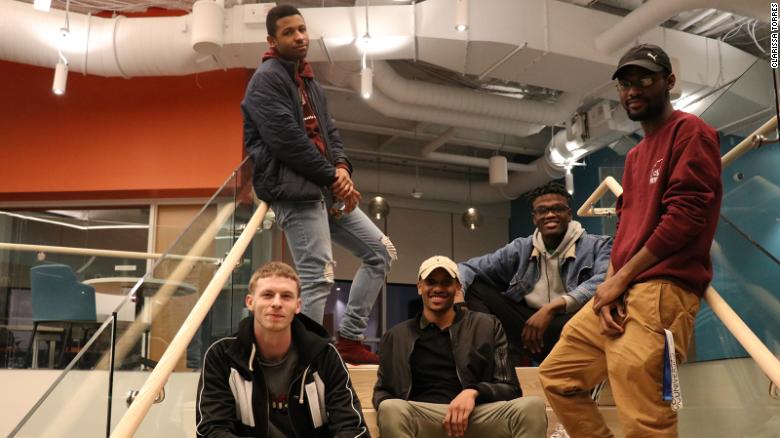At age nine, Nicodemus Madehdou moved from Monrovia, Liberia to Philadelphia and discovered how video games could connect him to a new culture. Always a puzzle aficionado, Madehdou liked the ways that visual exercises could be translated into the virtual world through gaming.
“I wasn’t immediately into gaming because at first, I was trying to just understand my environment. But when I started, it connected me to things I’d never known about.”
First, Madehdou played individual games, but as he grew more comfortable, he competed with other people. In this way, video games became an immersive way to navigate a new culture and make friends.
Now he creates space for other young people to bridge their own cultural gaps through his video game production studio. With hopes to diversify the industry and create games representative of the increasingly diverse gamers who may play them, JumpButton Studios is sparking change in an industry that is still overwhelmingly white.
In the five years since JumpButton’s founding, Madehdou and his co-founders have worked to build multiplayer programs and animations to engage the K-12 demographic. Among their latest ventures are explorations into A.I. and machine-learning to help gamers with accessibility differences. Compelled by the story of a young gamer who suffered episodic memory loss, JumpButton built an application to help him better remember his life events through data and his own memories. Madehdou recounts this as one of his most rewarding experiences since founding the video game studio.
These social impact ventures caught the attention of Temple University, which partnered with the JBS team to start educational impact initiatives targeted to middle school to college students.
Making change within a changing industry
Competitive gaming has shifted notions of what belies sport and recreation. Online streaming platforms like Twitch.tv allow players to stream real-time gameplay to audiences all over the world. High stakes e-sports prizes have attracted more and more attention over the years, leading to greater investment. In a pre-Covid world, e-sports matches were often held in arenas, similar to those traditionally reserved for in-person athletic matches.
“It’s the potential for prizes, the excitement of playing against other people, yelling at the other side, winning,” Madehdou says, describing how the fanfare of the competitive gaming mirrors those of other sports.
Beyond the high-energy world of e-sports, though, there is still the world of what Madehdou calls “hyper-casual games.” This is where JumpButton thrives. Games that can be played on the go, adventure games, and games that challenge cognitive skills are the studio’s specialty, and retain unique attention among younger gamers.
If you can’t join, create your own
Madehdou has turned his youth into an asset. When he was just 15 and trying to find an internship with entertainment and tech studios at Google, Apple and Facebook, he quickly realized that he was too young for most internships. So he turned to entrepreneurship instead. Still in high school, he joined with then-partners Matthew Auld, Dat ‘Kevin’ Ngo, Calbert Warner and Daniel Ostermiller to create JumpButton Studios in 2012.
“We found that creating games was something we were capable of,” Madehdou reflects. “When we were able to center education and social justice around the process we were experimenting with, we got invited to present what we were working on.”
Madehdou and his team were recognized by the White House for their work as young developers. Convention showings followed and, eventually, they were invited to the renowned E3 Expo, the largest trade event in the gaming world.
Diversifying an industry
Even as the opportunities multiplied, JumpButton Studios noticed a pattern. “When we walked in the room to talk about our projects, we were the only diversity there, which was an odd feeling on top of being young kids in high school still,” Madehdou tells CNN. Like other areas of the tech industry, gaming is still overwhelmingly white and male. Less than two percent of gaming developers are people of color.
Madehdou’s hope is that the work of his team challenges traditional approaches to diversifying this sector of the gaming world. It has to go deeper than hiring more people of color, he explains. Instead, the industry needs to ask how it got to this level of underrepresentation in the first place. He hopes that as JumpButton continues to pursue projects that directly impact young, Black gamers, kids will be able to envision themselves making change in the field as well.
>>>>


